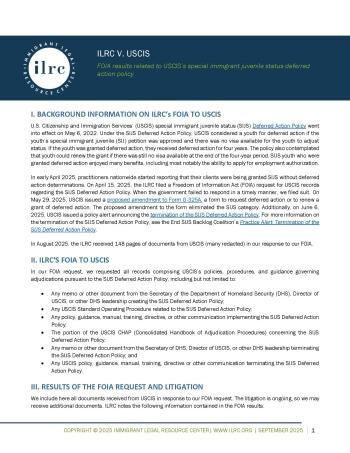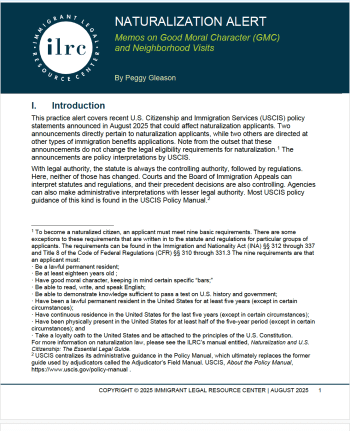
On April 15, 2025, the ILRC filed a Freedom of Information Act (FOIA) request for USCIS records regarding the SIJS Deferred Action Policy. When the government failed to respond in a timely manner, we filed suit. This resource includes all documents we have received from USCIS as a result of the FOIA request, as well as a short summary of the request and results.

This practice alert covers recent U.S. Citizenship and Immigration Services (USCIS) policy statements announced in August 2025 that could affect naturalization applicants.
On July 28, 2025, the ILRC submitted a comment opposing a new government rule that imposes massive civil fines—sometimes up to nearly $2 million—on immigrants who entered the U.S. without authorization or did not leave after a removal order.
On July 28, 2025, the ILRC submitted a comment opposing a new government proposal to add extra questions to nine immigration forms, including applications for naturalization, asylum, and green cards.
On July 24, 2025, the ILRC submitted a comment strongly opposing the government’s proposed changes to Form G-325A and related policies that end protections for three vulnerable groups: young people with Special Immigrant Juvenile Status (SIJS), stateless individuals, and immigrant workers in the Deferred Action for Labor Enforcement (DALE) program.
The ILRC strongly opposes new U.S. Citizenship and Immigration Services (USCIS) policy changes that end deferred action for youth approved for Special Immigrant Juvenile Status (SIJS).
On July 16, 2025, ILRC submitted a comment opposing a new U.S. Citizenship and Immigration Services (USCIS) policy that allows the agency to use “derogatory information” against immigration applicants without always disclosing it.
On July 7, 2025, the ILRC submitted a comment opposing a new federal rule that changes how the Office of Refugee Resettlement (ORR) handles unaccompanied children.
On May 2, 2025 the ILRC submitted a letter signed by 115 organizations has opposing a U.S. Citizenship and Immigration Services (USCIS) proposed rule to expand the information collected on immigration forms.
On May 2, 2025 the ILRC submitted a comment opposing a proposed U.S. Citizenship and Immigration Services (USCIS) rule that would expand the collection of personal information from immigration applicants.